ASTANA – The impressive success of the film “Mirzhakyp. Oyan (Wake up), Kazakh!” in movie theaters underscores the growing interest Kazakh society holds in its nation’s history, eminent historical figures, and the Kazakh language.
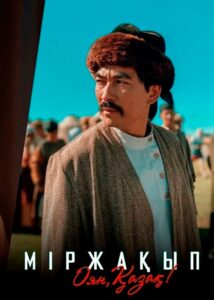
Actor Bakhyt Hadjibayev brought Mirzhakyp Dulatov’s character to life. Photo credit: ticketon.kz
“Mirzhakyp. Oyan, Kazakh!” tells the life story of Mirzhakyp Dulatov, a prominent Kazakh poet, writer and one of the leaders of the Alash movement of Kazakh intelligentsia from 1909 until his death in 1935. It also covers pivotal moments in Kazakh history under the Tsarist and then Soviet rule.
Originally, this historical drama was conceived as a six-part series financed by the Kazakhstan National TV and Radio Corporation. It premiered on the Qazaqstan national TV channel and was later showcased on the channel’s official YouTube in December 2022.
“After noticing its commendable viewership, the TV channel proposed an experiment: to adapt it into a cinematic version. We condensed 350 minutes of runtime to 137 minutes,” recounted director Murat Yeszhan during an interview with Exclusive journal.
The historical drama has no doubt benefited from its production as a film. Since its debut in theaters on Sept. 21, the movie has rapidly gained traction, with numerous showings sold out across various cinemas.
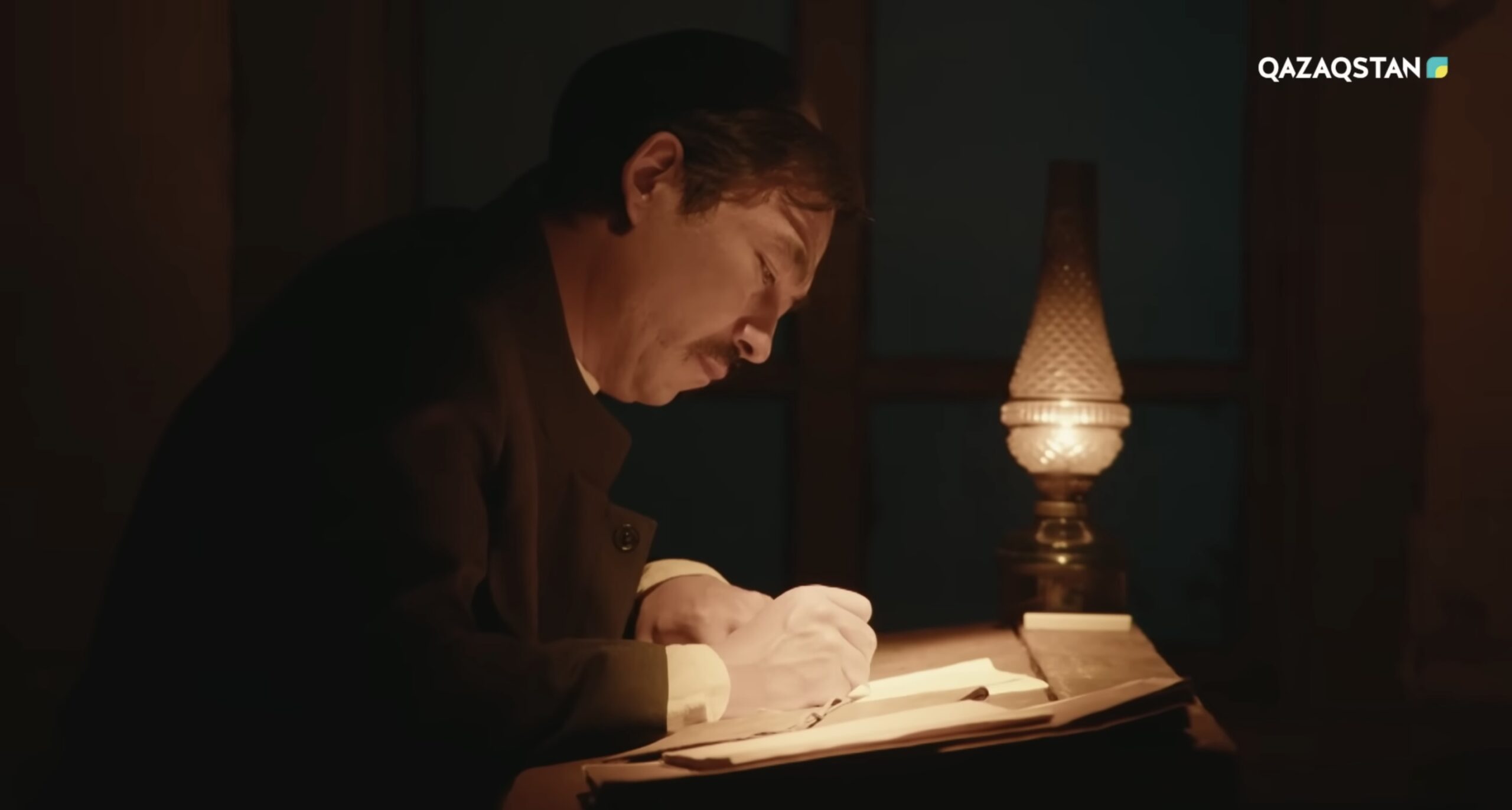
Dulatov was the author of the first Kazakh novel, “Bakhytsyz Zhamal” (Unhappy Zhamal) and he wrote the first math textbook for school children. Still from the film.
According to the Qazaqstan TV channel report, 140,000 people watched the film in 15 days. Ticketon box office data show that “Mirzhakyp. Oyan, Kazakh!” has overtaken several other Kazakh films to become the top-grossing film on Oct. 12-15, earning over 107 million tenge ($225,000).
The film also made waves on the TikTok platform, with the hashtag #оянқазақ prompting users and cinema enthusiasts to watch the movie.
Notably, the film’s foundation rests on more than 30 primary sources, including archival documents and monographs. The script is a collaborative effort of three individuals: director Murat Yeszhan, writer and playwright Ularbek Nurgalymuly, and historian and Alash expert Ushkyn Saidrakhman.
Revealing the unknown about Mirzhakyp Dulatov
How many would have known that Dulatov was the author of the first Kazakh novel, “Bakhytsyz Zhamal” (Unhappy Zhamal) or that he wrote the first math textbook for school children before they saw the film? Probably not many. That is the power of biopics.
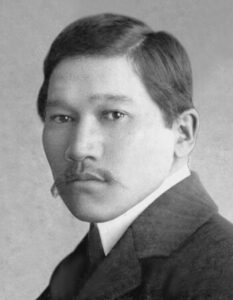
Mirzhakyp Dulatov.
The opening scene starts with Dulatov’s manifesto to all Kazakhs in his following verses:
“Open your eyes! Wake up, Kazakh! Raise your head!
Stop living in darkness and ignorance.
The land is gone, losing faith, our condition significantly worsened,
Оh beloved Kazakhs, we can no longer lie idle.”
The debut collection of poems titled “Oyan, Kazakh!” was released in 1909. It instantly sold out and saw a reissue in 1911. The film depicts Dulatov’s experiences, with actor Bakhyt Hadjibayev bringing the character to life. Dulatov faced repeated imprisonment and surveillance due to his political involvement and efforts to enlighten the Kazakhs. This led to his arrest in 1928, culminating in his death at the Solovki labor camp in 1935.
Warm welcome by viewers
After receiving a lukewarm response to his previous historical dramas, “Ahmet. Teacher of the Nation” and “The Path of Abai,” the director admitted he had not anticipated such fervor among viewers.
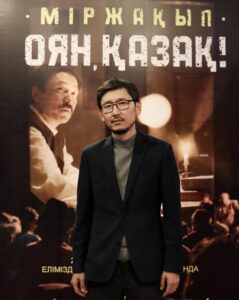
Director Murat Yeszhan. Photo credit: Murat Yeszhan’s Facebook
“We truly never imagined that ‘Oyan, Kazakh!’ would create such a buzz. The overwhelming support from the audience filled us with profound emotion,” Yeszhan shared on Facebook.
Due to immense demand on social media, its initial two-week run in theaters was extended by another week.
The film’s triumph also suggests a growing interest in Kazakh-language cinema.
“In the past, we felt that Russian speakers inhabited a different world, seemingly distant from the Kazakh-speaking audience. However, now, we sense a newfound unity among all residents of Kazakhstan. A friend’s daughter mentioned how, during a class outing to the film, her Russian classmate Anya was moved to tears by the story,” film producer Aisaule Abilda recounted in an interview with Exclusive journal.
Film’s perception in society
“Mirzhakyp. Oyan, Kazakh!” tries to present a rounded view of the transitional period at the beginning of the 20th century with all its harmful consequences to Kazakh society: from hunger to the prosecution of Kazakh intelligentsia. It is set to ruffle feathers with its portrayal of hostile politics and the ruthless methods used by Soviet authorities to suppress perceived political enemies.
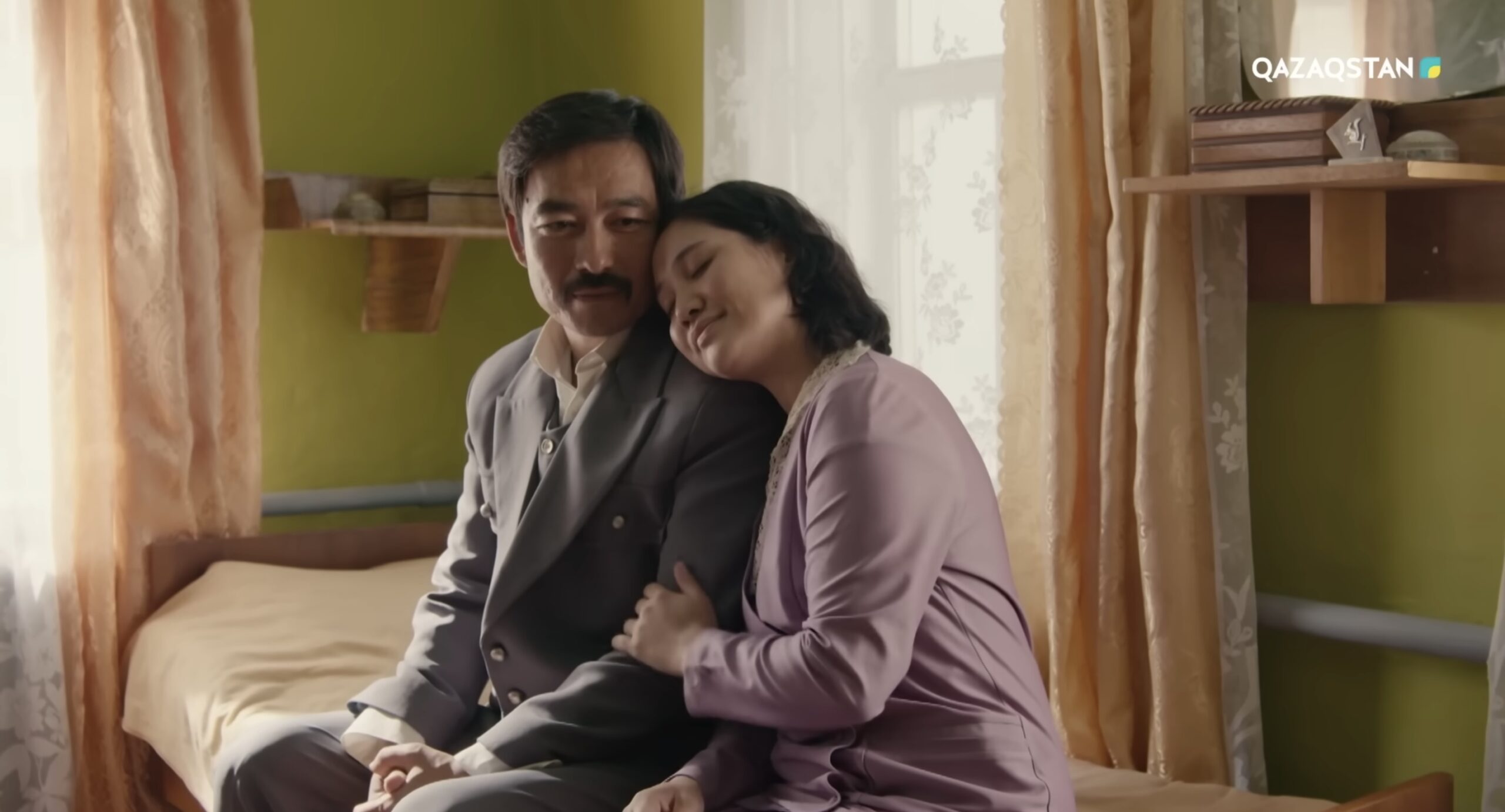
The film covers the story of Dulatov’s love life and family as well. Still from the film.
“A renowned censor from the Tsarist era, Smirnov, personally remarked that Mirzhakyp’s ‘Oyan, Kazakh!’ encouraged the youth towards education and rallied Kazakh readers to unity. We stayed true to that vision, but with a broader goal: to spur the intellectual, spiritual, and professional reawakening of the nation. ‘Wake up!’ is not merely a catchphrase; it’s a call to amplify our internal fortitude and elevate our external stature. It is crucial not to let such a message be twisted into incitement,” said director Yeszhan.
The film also depicted scenes of betrayal, conspiracies, and false accusations, where Kazakhs turned against their own kin, driven by motives ranging from jealousy and fear to career ambitions.
According to Mambet Koygeldiyev, doctor of historical sciences and anthropologist, “Mirzhakyp. Oyan, Kazakh!” is not a mere biography but a film where one can catch a glimpse of something that is much deeper.
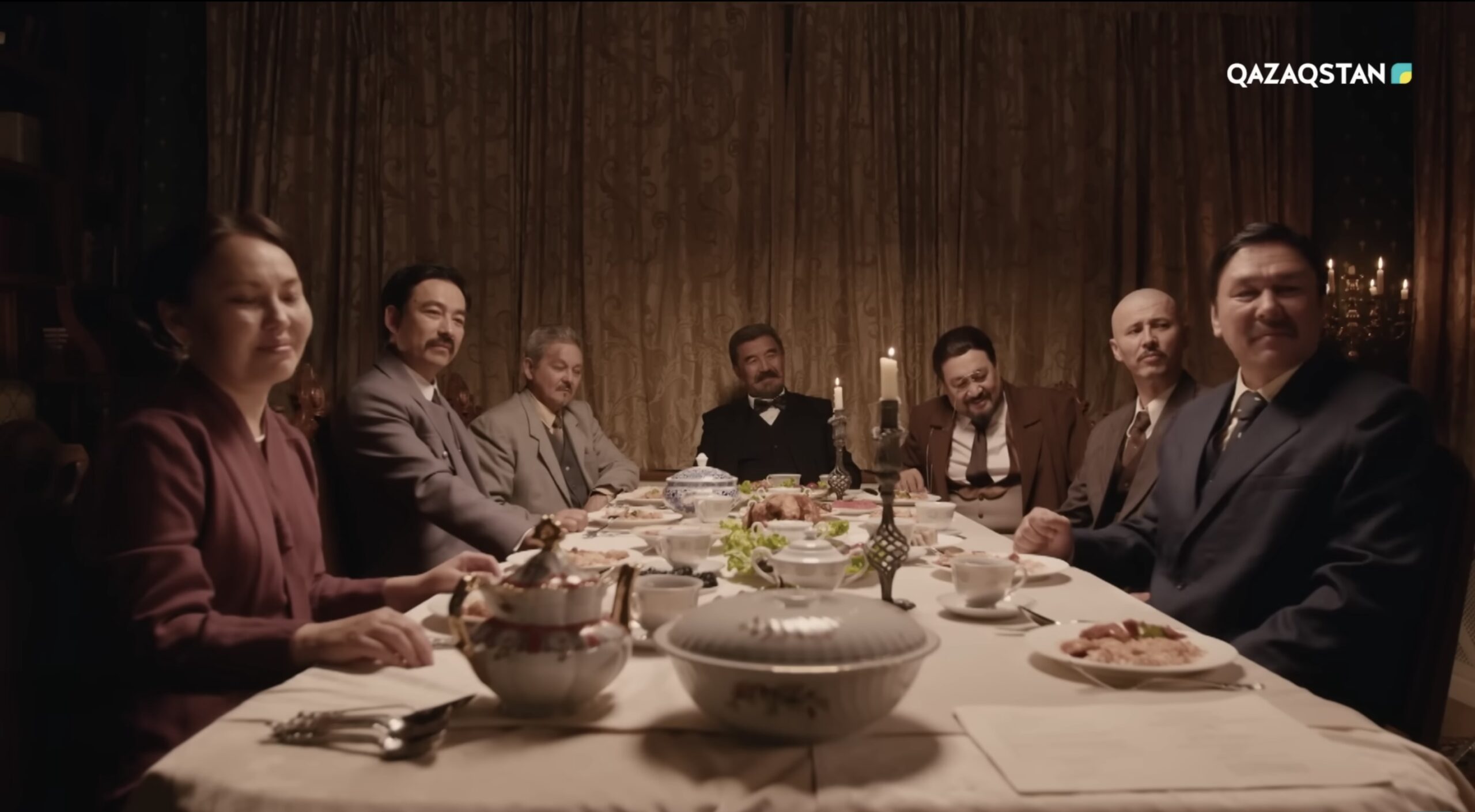
Leaders of Alash movement headed by Alikhan Bokeikhan (M) played by Bauyrzhan Kaptagai. Still from the film.
“The fact that Murat Yeszhan’s film caused a stir in Kazakh society is not just an ordinary case. Kazakhs need to wake up. Due to new demands, new era, due to a fateful period, the nation needs to awaken,” Koygeldiyev told Qaz365.kz news agency.
“You can’t say that the contemporary era is easy. It’s a difficult time. At such a time, young Kazakh viewers watch ‘Oyan, Kazakh’ and come out crying for a reason. It is a reflection of people thinking about their ancestors. It is a sign that people are no longer indifferent to their language, culture, and future,” he added.
Astana resident and film enthusiast Aldiyar, who preferred not to share his last name, says the film is a rare asset for Kazakh cinematography in the biopic and historical drama genres.
“It is great to see that during the boom of Kazakhstan’s escapist comedies and romanticized nostalgia for understandable brotherly stories, there is room for films of a quite recent and dark period of our history. The movie spans decades of national history, tragedy and trauma – under-told, under-experienced and not fully worked through,” he said.
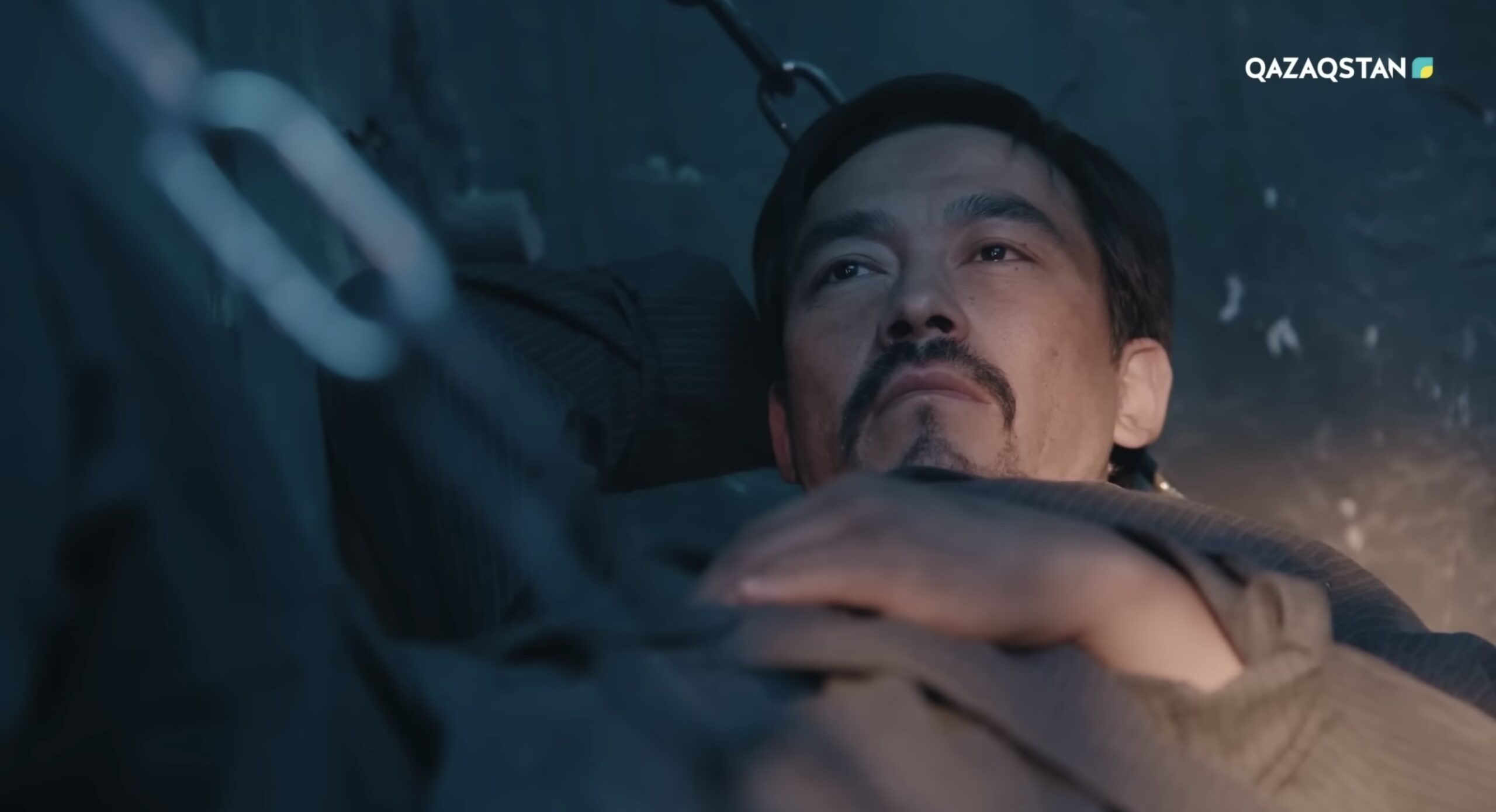
The film captures Dulatov’s late years in prison. Still from the film.
He believes when a film attempts to chronicle the entirety of a historical figure’s journey, it runs the risk of merely skimming the surface of the subject.
“On the one hand, it was a movie about a strong individual who unselfishly and sincerely cheered for his people, who managed to inspire and awaken humanity and compassion in people, who did not give up despite government denials or imprisonment. On the other hand, the story is about a simple guy who dreamed, fell in love, raised children and lived mostly within the limits he had,” said Aldiyar.
The film’s most contentious element is its inherent limitation: being anchored to a historical personality, it could not delve deeply into either the era or the broader emotional journey of its protagonist.
“The movie tried to tell much of the man’s life, his ambitions for the Kazakh people along with his peaceful life as a man, but failed to reveal any of this,” he added.
Ultimately, such films might serve as a wake-up call for Kazakh filmmakers and the industry to take the biopic genre to new heights.
“It should be kept in mind that Kazakh cinematography is quite young – less than 100 years old – and we are just learning to tell true stories about political leaders, who have been long ignored, so perhaps both filmmakers, politicians, and viewers are only now beginning to wake up,” he said.
The full-length picture consisting of six series is available on YouTube in Kazakh with English and Russian subtitles.

